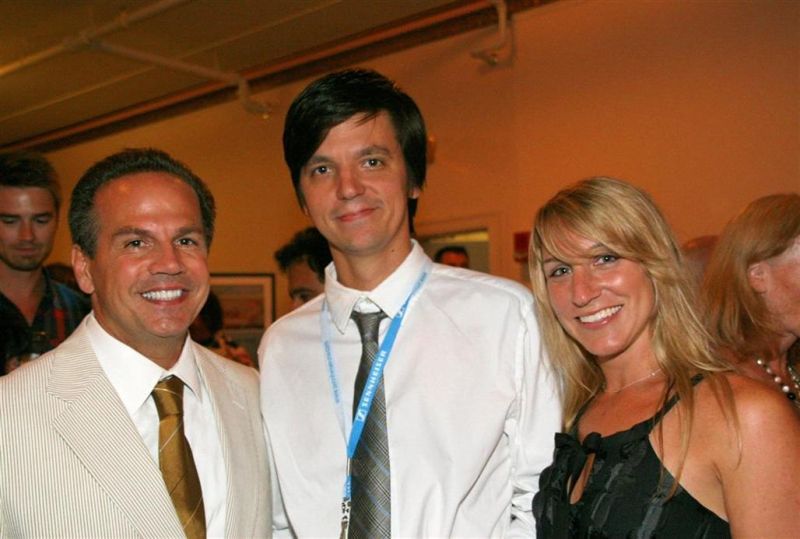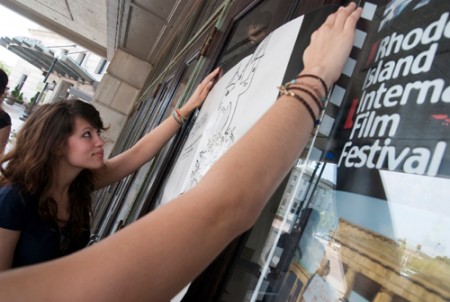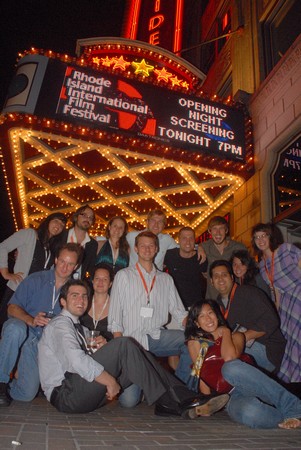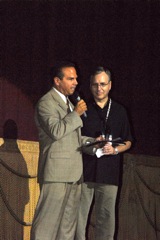|
|
||
|
Pro Tools
FILMFESTIVALS | 24/7 world wide coverageWelcome ! Enjoy the best of both worlds: Film & Festival News, exploring the best of the film festivals community. Launched in 1995, relentlessly connecting films to festivals, documenting and promoting festivals worldwide. Working on an upgrade soon. For collaboration, editorial contributions, or publicity, please send us an email here. User login |
LOS ANGELES FILMMAKER JEFFREY ROTH TO TEACH AT KIDSEYE™ SUMMER FILMMAKING CAMPKidsEyeTM Summer Filmmaking Camp was created by the RI International Film Festival (RIIFF) 10 years ago in order to give voice youth filmmakers and allow their creative ideas to come to life on the silver screen. This summer RIIFF is proud to announce that Jeffery Roth, director of the award winning feature length documentary The Wonder of It All, will be teaching at KidsEyeTM Summer Filmmaking Camp. Roth will be working intensively alongside our campers to help them write, direct, and produce their original short films. KidsEyeTM Summer Filmmaking Camp is open to youth between the ages of 8-16. The day camp will take place at University of Rhode Island from July 7-11, 2008. Tuition is $340. Applications are available through the Rhode Island International Film Festival. The Wonder of It All: An Interview with Jeffery Roth by George T. Marshall In the 1960s, reaching the moon was not only about science but also politics. There was a space race between the United States and the Soviet Union—a race which the U.S. won when Neil Armstrong walked the moon on July 20, 1969. Twelve Americans left their footprints on the lunar surface during six landings from 1969 to 1972. Three, Alan Shepard, Pete Conrad and James Irwin, have died. While they may not label themselves as heroes, these men touched the American zeitgeist in ways that impact us even today. What made them so special? What promise to they hold out for generations after them? What can we learn from their achievements? Enter film director, Jeffrey Roth who has set out to answer these questions with his new documentary, The Wonder of It All. Some Background Jeff Roth attended California State University Northridge where he earned his Bachelor of Arts with an emphasis in film production. He started working on television movies as an intern in the camera department and from there worked his way up to become a camera assistant on TV sitcoms. According to Jeff: “I wanted to learn how the set worked, so I thought that being in the camera department would at least allow me to stay on the set. “My dream has always been to tell a story that I believed in. “From the time that I was 10 years old, I would go to Universal Studios and sit on the tram and dream about being a Director. When the idea for this project came up, I was thrilled to have the chance to tell the story of the remarkable men who became moonwalkers. This is a humanistic story that I feel needs to be told.” “The Wonder of It All” recounts the narrative of the journeys of the 12 men who walked on the moon—from childhood to the present. Each astronaut talks candidly about his adventure. What makes this truly amazing is that until this film, there has been no personal account of how these historical missions affected each man as human beings. This film took 2 years to make. From the beginning, the goal was to make a humanistic story that allowed these remarkable men to talk about their lives and explore how walking on the moon affected each one personally. Roth and his team were able to conduct in depth interviews with 7 of the men that made these journeys. From this, they ended up with over 12 hours of footage that then had to be painstaking narrowed down to 90 minutes. What viewers will see are men who have not only gazed into space, but have looked into their own souls. Since the producers were able to develop trust and a strong rapport with the astronauts, some remarkable revelations surfaced. As the cameras ran through narrative pauses, the interviewees spontaneously blurted out thoughts they may never have spoken before as illustrated by Aldrin’s deeply personal description of the impact on him, prior to Apollo 11, of his mother’s unexpected suicide. “We’ve long since taken off the silver suit and helmet,” said Eugene Cernan of Houston, the last man to walk the moon on Apollo 17. “We’re no longer invincible — we’re grandfathers. We’ve mellowed and gotten nostalgic.” Other moonwalkers interviewed were Apollo 12’s Alan Bean and Apollo 16’s John Young, both of Houston; Apollo 16’s Charles Duke Jr. of New Braunfels; Apollo 11’s Edwin “Buzz” Aldrin; Apollo 14’s Edgar Mitchell of Lake Worth, Fla.; and Apollo 17’s Harrison Schmitt of Albuquerque, N.M. It turns out that Jeff Roth, 37, has been a space buff for most of his life. “Think about it: Wouldn’t it be cool if you could watch a documentary on Christopher Columbus where he’s interviewed? Well, we had that chance with the moonwalkers.” “There were only 12 moonwalkers. If there had been 100, you wouldn’t have the same mystique. But these are the guys — the men who walked the moon. Nine are still here, and it’s time we gave them a listen.” Time indeed. When I spoke with Jeff recently we discussed making the film and I learned more about what made him tick as well. Our interview went like this: GTM: Tell us a bit about yourself: your academic and professional background. Just who is Jeffrey Roth? Jeffrey Roth: I went to film school at California State University Northridge where I earned my BA. My parents died during my freshman year and that put my career on hold. I tried to do everything that I could to stay in school, but that was not easy and extended my term to 6 years. During that time I longed to be with a family again and I met my wife Cindy. Trying to launch a film career and support my family was not easy, so I tried different jobs on film sets from PA to the sound and camera departments. I enjoyed being a camera assistant as it kept me on the set so I could learn. Since my kids were born, I was fortunate enough to work on TV sitcoms, which allowed me to have a life and still make a living. But I never gave up my dream of being a filmmaker. GTM: Why did you decide to produce a documentary on American astronauts? What is it about their lives that you found a source of inspiration? Jeffrey Roth: I decided to do a documentary on American astronauts because I realized the need to tell the story. While there are a lot of movies already about the space race, the stories of the individual astronauts have never been told. Especially the human side. Who are they? Most people cannot name three of the twelve men who have walked on the moon, despite the fact that these men have performed feats of incomparable merit. These men, all in their seventies now, have such a unique place in world events that I wanted to document their lives before we lose them to history. GTM: How did you go about deciding how you wanted to shoot this documentary and what footage you wanted to obtain? Jeffrey Roth: I wanted to shoot this documentary by making it personal. I want the viewer to feel like they are sitting in a room with these extraordinary guys listening to their stories. There is only a limited amount of NASA Apollo footage and most of it has been shown over and over again through the years in earlier projects. I decided early in the making of my film to only use NASA footage to illustrate the points made by the astronauts while they were speaking, and not use the footage to tell the main story. The narrative in my film is provided by the astronauts themselves. This fact differentiates my film from the many other films about the moon landings. GTM: Tell us about your timeline for the evolution of this work. Jeffrey Roth: I was inspired to make this film in mid-2004 during a casual conversation with a friend. During the conversation we discussed the fact that men who had walked on the moon were now living in obscurity. This thought fascinated me. Later, the idea of doing a film about them gained momentum and I decided to ask the astronauts to participate. At first only a few agreed, but with persistence, I finally was able to convince seven of the remaining nine moonwalkers to join the project. My first interview was with Charlie Duke. In hindsight, it was considerably fortunate that he was the first of the astronauts because we were all nervous and he made us feel comfortable. Later came Alan Bean, John Young, Edgar Mitchell, Buzz Aldrin, Gene Cernan, then Harrison Schmitt. I can remember that we were happiest to get John Young on film, because he declined our interviews several times, and then changed his mind after his retirement from NASA. I regret that Dave Scott and Neil Armstrong declined to participate. Dave Scott decided to do a competing project, and Neil Armstrong is reluctant to give interviews. We are still amenable to including them on film in case they change their minds! GTM: How was this production funded? Jeffrey Roth: We are very proud of the fact that we were self-funded. This gave us more control over the project and enabled us to create the kind of film we envisioned. You will only see our vision on the screen GTM: What has it been like touring the Festival circuit? Can you tell us about some of your experiences? Jeffrey Roth: There is no greater joy to me than seeing a film that I conceived being shown in front of an audience. I love to watch the reactions in the crowd. The film festivals have allowed me to experience that. The most satisfying experience to me has been the fact that several of the moonwalkers have accompanied me to showings at the film festivals. I have really enjoyed spending more time with them in this way. GTM: What did you learn that you didn’t know about the individuals who were involved with the American space program and how has that impacted on you? Jeffrey Roth: To me, the most striking and surprising thing that I learned about the astronauts was how truly dedicated to their work they were. These guys were not worried about fame or fortune, they were concerned mainly about the tasks ahead of them and how best to do their jobs. As they were walking on the moon they weren’t marveling at their surroundings, they were working hard to accomplish the many tasks assigned to them. I didn’t have a full appreciation of that fact before I made the film. GTM: If you were to do this over again, what would you do differently? Jeffrey Roth: I am very happy with the final result of my film, so that is a difficult question to answer. Having said that, there are always more questions to ask the astronauts, and more ways we can tweak the film by editing it or making another program. GTM: What would you like to see happen this work? Jeffrey Roth: In my view, the main purpose in making this film has been accomplished. I have placed the words and thoughts of seven outstanding humans in a sort of time-capsule that will survive us all. My only hope is that our film will have a wide distribution, so that others can also learn about these men. GTM: You have a rather famous relative in the film business who early on established some of the boundaries that are defined as what makes up an independent filmmaker. How has that shaped you if at all? Jeffrey Roth: Having watched Bobby Roth, my Uncle, make independent films for years now, I could see that you did not need the support of a studio to make your project. Having seen the success of his films, I was convinced that I could do the same. The fact is, you need to have a compelling story and characters. It makes no difference if you spend $50,000 or $50 million dollars. You can go the theatres and see high budget films that will be forgotten about within a year or so. GTM: Has this documentary inspired you to do another project? If so what would that be? Jeffrey Roth: There are millions of stories to tell. We have been able to document seven of them with this film. I have been inspired by this process to continue that work. During the past few months many astronauts who didn’t go to the moon but still have led interesting lives have approached me to document their stories as well. I am currently thinking about appropriate ways to document their biographies through film. I don’t want to become only an “astronaut filmmaker” but I am struck by the richness of the material that is being presented to me. Perhaps I’ll do one more astronaut-related project before moving on to other subjects. GTM: What would you tell a film student at a college about approaching a career path in this discipline? Jeffrey Roth: If this is your passion, then you need to stick with it. For a select few, it will be easy. But for most, it will not. That does not mean you should be discouraged. There are many stories to be told and ways to tell them. With all the new technology out there, it is easier than ever to make an independent film. GTM: Is there anything else you’d like to add for our readers? Jeffrey Roth: I would like to add my thanks to the people of the Rhode Island International Film Festival for the kindness and generosity shown to me over the past few months. They gave us the opportunity for our first New England screening. To learn more about Jeffrey Roth and his film “The Wonder if it All” go to the website at:< http://www.thewonderofitallfilm.com> About the Author: George T. Marshall is the Executive Director of the Rhode Island-based Flickers Arts Collaborative, the creators of the annual Rhode Island International Film Festival for which he also serves as Executive Director. 20.05.2008 | flicksart's blog Cat. : Alan Bean Alan Bean Alan Shepard Apollo 1 Apollo 11 Apollo program Bobby Roth Business Business California State University Charles Duke Jr. Charlie Duke Cindy Dave Scott documentary Edgar Mitchell Entertainment Entertainment Eugene Cernan Eugene Cernan festival filmmaking Films Flickers Arts Collaborative Gene Cernan George T. Marshall Harrison Schmitt Houston James Irwin Jeff Roth Jeffery Roth Jeffrey Roth John Young kids Lake Worth Moon Landing National Aeronautics and Space Administration Neil Armstrong Pete Conrad Rhode Island International Film Festival Soviet Union Spaceflight summer camps Technology Technology the Rhode Island International Film Festival the RI International Film Festival The Wonder of It All The Wonder of It All Truly United States United States Universal Studios University of Rhode Island FESTIVALS
|
LinksThe Bulletin Board > The Bulletin Board Blog Following News Interview with IFTA Chairman (AFM)
Interview with Cannes Marche du Film Director
Filmfestivals.com dailies live coverage from > Live from India
Useful links for the indies: > Big files transfer
+ SUBSCRIBE to the weekly Newsletter Deals+ Special offers and discounts from filmfestivals.com Selected fun offers
> Bonus Casino
User imagesAbout flicksart Marshall George T. Marshall George T. (FLICKERS: Rhode Island International Film Festival) George Thomas Marshall is the founder and producing director of the Flickers the Newport Film Society & Arts Collaborative, a non-profit organization with 29 years of experience producing programming and creative outlets for filmmakers, visual and performing artists. In addition to producing the acclaimed Rhode Island International Film Festival, one of Flickers' most successful events to date, it also created the annual Jubilé Franco-Américain - a week-long celebration of French Canadian culture, art and cuisine which is held annually in Northern R.I. This event was awarded the Governor's Tourism Award and drew over 20,000 annually.
Mr. Marshall created,
produced and hosted the fine arts informational television
program, "Between Takes," which received
numerous awards from the states of R.I., Massachusetts
and national recognition. His work has won three and been
nominated for four New England Emmy awards, won four national
Telly awards, top prizes at WorldFest Houston, and
won three national Communicator
Awards for Excellence.
He also teaches communications, television
production, public speaking and acting for camera courses at various
colleges and universities in the area and
serves as
media / marketing consultant to businesses and
non-profit
organizations. Mr. Marshall is a frequent
contributor and participant on industry panels and seminars exploring
the evolution, culture, growth and future of independent film. In 2006, he created a Special Topics Course at Roger Williams University on Documentary Film and Journalism, which he now teaches yearly during the Spring semester. He recently completed a chapter entitled "Teaching Digital Documentary Film New Technologies Meet the Art of Storytelling" for the new college text book: “Teaching with Multimedia: Pedagogy in the Blogo/Websphere,” which is being released in 2010. He was on a committee that developed the New Media & the Global Diaspora Symposium, at RWU October 2008, where he chaired a panel on international media and film. He is working with faculty on developing a Film Minor for the Communications Department at Roger Williams University. In the Fall of 2009, he introduced the first Film and Video course on campus. In the Spring of 2010, he introduced a new course to the curriculum: "Curation and and Film Festival Production." Currently, he is enaged with school administration in establishing the Roving Eye Film Festival as a yearly event on campus and will bring the Tournées French Film Festival to campus for the 2010-2011 academic year. In the Fall of 2008, Mr. Marshall chaired a panel on Documentary Film at the Ruff Cutz Indie Film Conference, Center for Digital Imaging Arts at Boston University, Waltham, MA. and presented on a panel at the International Film Festival Summit (IFFS) in Las Vegas, Nevada. His topic was creating new modalities for "Building a Culture of Community Outreach." In 2010, along with the Martha's Vineyard International Film Festival and the Woods Hole Film Festival, he was a principal in the creation of the New England Film Festival Alliance (NEFFA), an organization designed to link New England Film Festivals and create a nexus for joint sponsorships, information sharing and cross-promotion. In the Fall of 2010, Mr. Marshall will introduce a new film Festival that he created to the New England region: the Flickers: North Country Film Festival. Scheduled to launch at The Balsams in Dixville Notch, NH, the Festival has been designed with the specific intent to spur cultural tourism and job creation. View my profile Send me a message The EditorUser contributionsUser links |





























